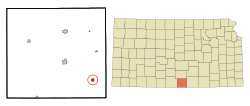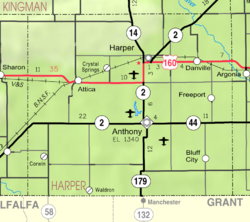Bluff City is a city in Harper County, Kansas, United States.[1] As of the 2020 census, the population of the city was 45.[3]
Bluff City, Kansas | |
|---|---|
 Location within Harper County and Kansas | |
 | |
| Coordinates: 37°04′34″N 97°52′31″W / 37.07611°N 97.87528°W[1] | |
| Country | United States |
| State | Kansas |
| County | Harper |
| Founded | 1879 (approx) |
| Incorporated | 1887 |
| Named for | Bluff Creek |
| Area | |
• Total | 0.51 sq mi (1.31 km2) |
| • Land | 0.51 sq mi (1.31 km2) |
| • Water | 0.00 sq mi (0.00 km2) |
| Elevation | 1,240 ft (380 m) |
| Population | |
• Total | 45 |
| • Density | 88/sq mi (34/km2) |
| Time zone | UTC-6 (CST) |
| • Summer (DST) | UTC-5 (CDT) |
| ZIP code | 67018 |
| Area code | 620 |
| FIPS code | 20-07775 |
| GNIS ID | 2394208[1] |
History
editBluff City was founded about 1879.[4] The community took its name from Bluff Creek, which flows past it.[5]
Bluff City was a station and shipping point on the Kansas Southwestern Railway.[6]
Geography
editAccording to the United States Census Bureau, the city has a total area of 0.54 square miles (1.40 km2), all of it land.[7]
Climate
editThe climate in this area is characterized by hot, humid summers and generally mild to cool winters. According to the Köppen Climate Classification system, Bluff City has a humid subtropical climate, abbreviated "Cfa" on climate maps.[8]
Demographics
edit| Census | Pop. | Note | %± |
|---|---|---|---|
| 1890 | 194 | — | |
| 1900 | 200 | 3.1% | |
| 1910 | 307 | 53.5% | |
| 1920 | 272 | −11.4% | |
| 1930 | 233 | −14.3% | |
| 1940 | 252 | 8.2% | |
| 1950 | 172 | −31.7% | |
| 1960 | 152 | −11.6% | |
| 1970 | 109 | −28.3% | |
| 1980 | 95 | −12.8% | |
| 1990 | 69 | −27.4% | |
| 2000 | 80 | 15.9% | |
| 2010 | 65 | −18.7% | |
| 2020 | 45 | −30.8% | |
| U.S. Decennial Census | |||
2020 census
editThe 2020 United States census counted 45 people, 21 households, and 11 families in Bluff City.[9][10] The population density was 88.9 per square mile (34.3/km2). There were 31 housing units at an average density of 61.3 per square mile (23.7/km2).[10][11] The racial makeup was 88.89% (40) white or European American (84.44% non-Hispanic white), 0.0% (0) black or African-American, 0.0% (0) Native American or Alaska Native, 0.0% (0) Asian, 0.0% (0) Pacific Islander or Native Hawaiian, 0.0% (0) from other races, and 11.11% (5) from two or more races.[12] Hispanic or Latino of any race was 8.89% (4) of the population.[13]
Of the 21 households, 33.3% had children under the age of 18; 23.8% were married couples living together; 14.3% had a female householder with no spouse or partner present. 42.9% of households consisted of individuals and 23.8% had someone living alone who was 65 years of age or older.[10] The average household size was 4.6 and the average family size was 5.2.[14] The percent of those with a bachelor’s degree or higher was estimated to be 0.0% of the population.[15]
20.0% of the population was under the age of 18, 2.2% from 18 to 24, 17.8% from 25 to 44, 35.6% from 45 to 64, and 24.4% who were 65 years of age or older. The median age was 53.3 years. For every 100 females, there were 66.7 males.[10] For every 100 females ages 18 and older, there were 71.4 males.[10]
2010 census
editAs of the census[16] of 2010, there were 65 people, 29 households, and 13 families residing in the city. The population density was 120.4 inhabitants per square mile (46.5/km2). There were 42 housing units at an average density of 77.8 per square mile (30.0/km2). The racial makeup of the city was 100.0% White.
There were 29 households, of which 24.1% had children under the age of 18 living with them, 37.9% were married couples living together, 3.4% had a female householder with no husband present, 3.4% had a male householder with no wife present, and 55.2% were non-families. 37.9% of all households were made up of individuals, and 10.3% had someone living alone who was 65 years of age or older. The average household size was 2.24 and the average family size was 3.15.
The median age in the city was 42.8 years. 23.1% of residents were under the age of 18; 3% were between the ages of 18 and 24; 32.2% were from 25 to 44; 27.7% were from 45 to 64; and 13.8% were 65 years of age or older. The gender makeup of the city was 55.4% male and 44.6% female.
2000 census
editAs of the census[17] of 2000, there were 80 people, 32 households, and 23 families residing in the city. The population density was 147.6 inhabitants per square mile (57.0/km2). There were 48 housing units at an average density of 88.6 per square mile (34.2/km2). The racial makeup of the city was 100.00% White.
There were 32 households, out of which 31.3% had children under the age of 18 living with them, 65.6% were married couples living together, and 28.1% were non-families. 21.9% of all households were made up of individuals, and 12.5% had someone living alone who was 65 years of age or older. The average household size was 2.50 and the average family size was 3.00.
In the city, the population was spread out, with 22.5% under the age of 18, 3.8% from 18 to 24, 25.0% from 25 to 44, 26.3% from 45 to 64, and 22.5% who were 65 years of age or older. The median age was 44 years. For every 100 females, there were 122.2 males. For every 100 females age 18 and over, there were 113.8 males.
The median income for a household in the city was $20,625, and the median income for a family was $31,458. Males had a median income of $28,750 versus $10,417 for females. The per capita income for the city was $10,030. There were 13.3% of families and 12.7% of the population living below the poverty line, including no under eighteens and 50.0% of those over 64.
Education
editThe community is served by Chaparral USD 361 public school district.[18]
Bluff City High School was closed through school unification. The Bluff City High School mascot was Tigers.[19]
References
edit- ^ a b c d U.S. Geological Survey Geographic Names Information System: Bluff City, Kansas
- ^ "2019 U.S. Gazetteer Files". United States Census Bureau. Retrieved July 24, 2020.
- ^ a b "Profile of Bluff City, Kansas in 2020". United States Census Bureau. Archived from the original on March 24, 2022. Retrieved March 24, 2022.
- ^ Kansas State Historical Society (1916). Biennial Report of the Board of Directors of the Kansas State Historical Society. Kansas State Printing Plant. pp. 202.
- ^ "Profile for Bluff City, Kansas". ePodunk. Archived from the original on July 14, 2014. Retrieved June 11, 2014.
- ^ Blackmar, Frank Wilson (1912). Kansas: A Cyclopedia of State History, Embracing Events, Institutions, Industries, Counties, Cities, Towns, Prominent Persons, Etc. Standard Publishing Company. pp. 199.
- ^ "US Gazetteer files 2010". United States Census Bureau. Archived from the original on January 25, 2012. Retrieved July 6, 2012.
- ^ Climate Summary for Bluff City, Kansas
- ^ "US Census Bureau, Table P16: HOUSEHOLD TYPE". data.census.gov. Retrieved January 16, 2024.
- ^ a b c d e "US Census Bureau, Table DP1: PROFILE OF GENERAL POPULATION AND HOUSING CHARACTERISTICS". data.census.gov. Retrieved January 16, 2024.
- ^ Bureau, US Census. "Gazetteer Files". Census.gov. Retrieved December 30, 2023.
{{cite web}}:|last=has generic name (help) - ^ "US Census Bureau, Table P1: RACE". data.census.gov. Retrieved January 16, 2024.
- ^ "US Census Bureau, Table P2: HISPANIC OR LATINO, AND NOT HISPANIC OR LATINO BY RACE". data.census.gov. Retrieved January 16, 2024.
- ^ "US Census Bureau, Table S1101: HOUSEHOLDS AND FAMILIES". data.census.gov. Retrieved January 16, 2024.
- ^ "US Census Bureau, Table S1501: EDUCATIONAL ATTAINMENT". data.census.gov. Retrieved January 16, 2024.
- ^ "American FactFinder". United States Census Bureau. Archived from the original on February 12, 2020. Retrieved July 6, 2012.
- ^ "U.S. Census website". United States Census Bureau. Retrieved January 31, 2008.
- ^ "Anthony-Harper". USD 361. Retrieved January 10, 2017.
- ^ "Bluff City High School". E-YEARBOOK.COM. Retrieved January 10, 2017.